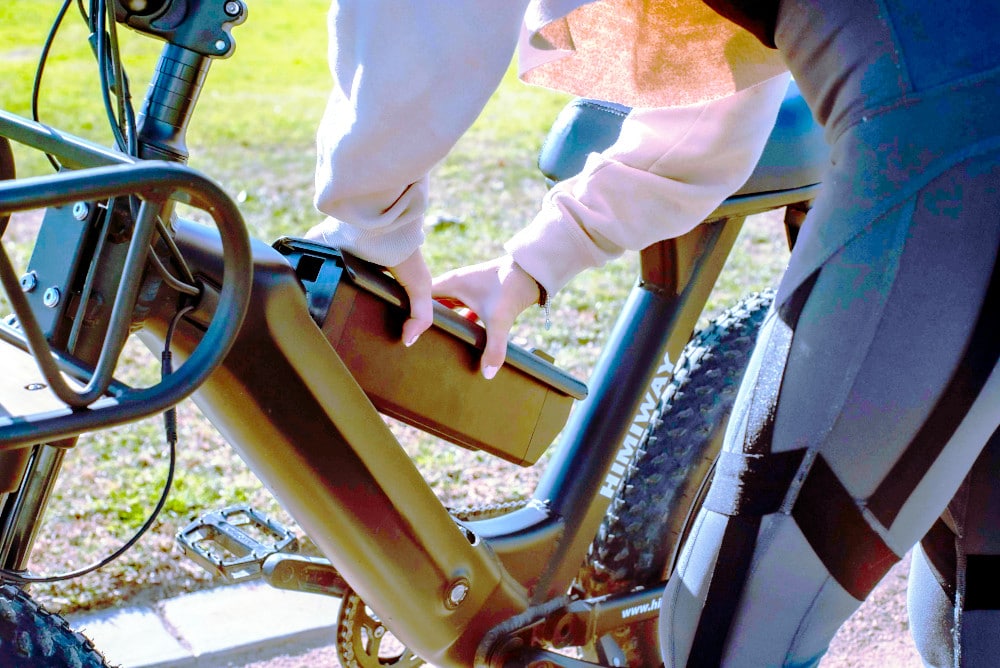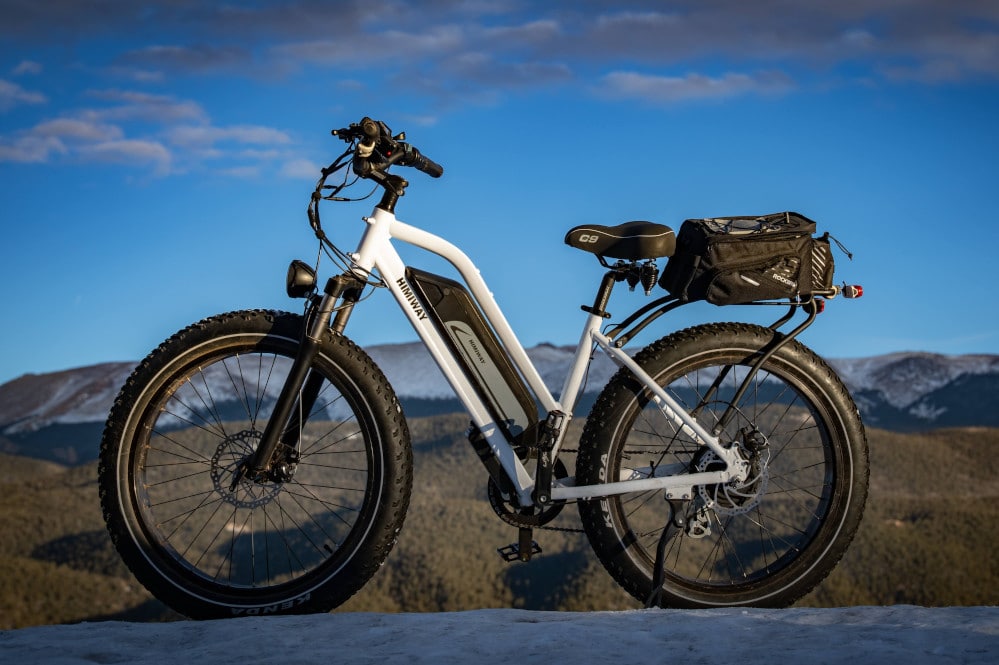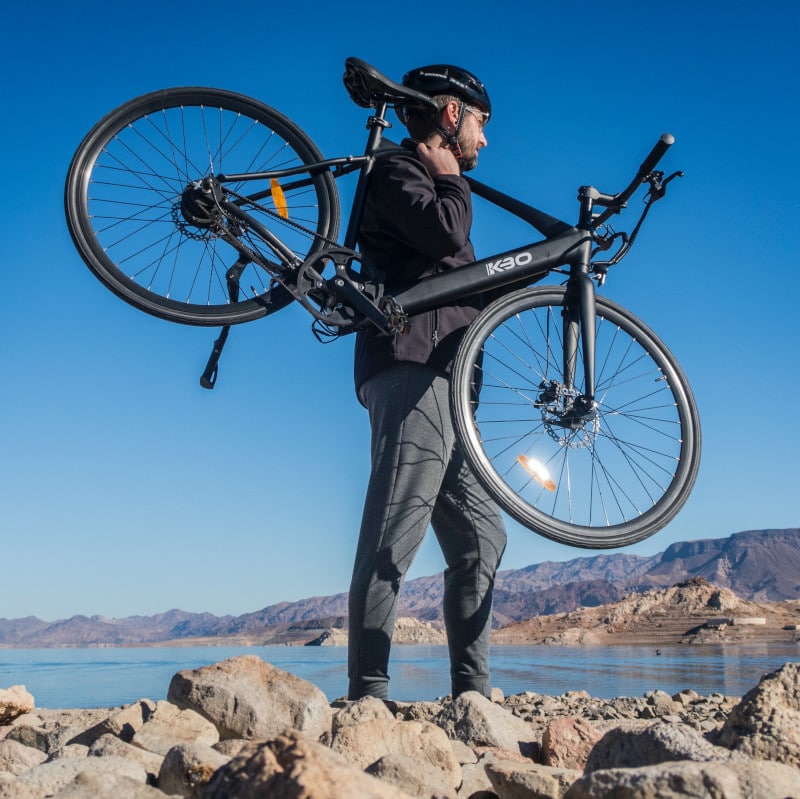Ebikes have a reputation of being heavy beasts. Yes, the battery and motor that power an ebike along is an incredible advantage when riding an ebike, and the additional weight factor of the battery and motor is not so significant when the bike is careering along under power. But the weight of an ebike does matter. Depending on your needs, your location, and distance you require to go, weight can matter a great deal.
When Does Weight Matter?
If you live in an apartment at the top of a building, with nowhere to store your ebike on ground level, weight can matter substantially. Carrying a heavy ebike up and down several flights of stairs every time you want to use it, can considerably lessen the desire to do so. Especially if one of the factors of buying an ebike was to enable you to cycle without getting hot and sweaty. Therefore, if you are getting hot and sweaty just hauling it downstairs before even starting out, you may soon begin to rue the day you bought a heavy ebike.
If you have distance to travel which may meet or exceed the range of the ebike between charges. In other words, if your battery runs flat and out of charge to power the motor, then for a while you will be pedalling a heavy ebike without power, which will be harder to do so due to the extra weight of the battery and motor.
There are ways to mitigate this scenario: using a lower power assist setting for longer distances, or switching off power assist entirely when unneeded, e.g., going downhill, or when you have a good wind behind you helping you along.
Another option is to carry an extra battery, and swap them around when one runs low, and ensure there are facilities to recharge your battery, or batteries, at your ultimate destination.
If you are a heavy person yourself, and your ebike is one of the heavier types, then speed and range will also be affected. The harder the motor has to work, the more power it drains from the battery, and even using maximum assist, take off speed will be slower, and hitting hills may still slow you down without some vigorous and arduous pedalling from yourself.
What Affects an Ebike’s Weight?
The most obvious factors in the extra weight of an ebike, compared to the weight of a traditional bicycle, are the additions of a battery pack and an electric motor. These are the crucial elements that make a bike an ebike, and they are mostly to blame for the added weight. There are other elements that add additional weight: a controller, wiring, handlebar controls for switching power modes, perhaps a throttle, and maybe LCD displays for giving out range and remaining battery power indications. They all add up though, to a total additional weight that is fine when the battery takes care of most of the effort to propel the machine, but becomes quickly cumbersome when the battery is flat and can’t work the motor.

Is Buying a Lighter Ebike an Option?
Buying a lighter ebike is definitely an option for some. Though, within a few pounds, the weight of a battery pack and motor will differ only slightly, unless you opt for a really powerful set up; a high-power motor and the larger battery pack to operate it, will add a great deal of weight. A normal ebike set up though will add around an additional weight of 20 pounds. You may be able to save a pound or two in weight by opting for a smaller battery pack and/or a less powerful motor. This will also cut down the effective range and power of the ebike. You may have to work physically harder to get to your destination.
With that in mind, then the only other option to lower the total weight of the ebike is to use lighter materials on the rest of the bicycle. This is certainly possible and there are ebikes available that have lighter frames, but ebike frames still need to be stronger than a conventional cycles frame; they have additional stresses and strains that a traditional bicycle won’t have, so even with a lighter frame, an ebike will still be a bit heavier than an equivalent conventional bicycle, before adding on the weight of a battery pack and motor.
Bear in mind also, that lighter materials are usually more expensive, so there will be a cost premium in purchasing an ebike made with lighter materials.
Should I Buy an Ebike Based on Weight Alone?
Basing your purchase of an ebike on the weight of the ebike alone, may not be the most sensible way to buy. Think about, first, what do you want the ebike for? What type of terrain will you be using it on? How far do you want to go before worrying about charging the battery again? What is the geography of the routes you will be taking; are they flat, hilly, smoothly paved, or rough and dirty tracks?
Buy the best ebike most suited to the use you will have for it. If you were buying a conventional bicycle, what type of bicycle would you buy? Then look to buying something similar only in ebike form.
See also: What Ebike Should I Buy?
And: Buying a Used Ebike
The Many Different Types of Ebike
There are small and light folding ebikes available, ideal for commuting short distances, then folding and carrying to the office, or upstairs, if you live in an upper apartment. You can easily carry these on buses or trains if these are a part of your commute.
There are larger commuting ebikes, ideal for further distances, comfortable to ride, and definitely require less physical effort. If you want to arrive at your place of work nice and fresh, then perhaps this is a serious option for you.
Mountain ebikes are probably on the heaviest end of the scale regarding weight, but are great to operate and a great deal of fun, whether you are using it on smooth roads or dirty hilly rough tracks.
Fat tire ebikes can go almost anywhere, whether you’re ploughing through deep snow, or careering across a beach. Great fun, and they look good too. Don’t let the battery go flat on one of these though, as physically pedalling home, without power, will definitely be a chore.
Above are just some of the options available if you are looking for an ebike. Weight is more of a factor on some rather than others, but again, don’t buy your ebike on weight alone. There are many other options and set ups of ebikes on the market; cruisers, road ebikes, racing ebikes, tricycles, and a range of cargo ebikes ideal if you regularly need to haul goods from place to place.

So, What Does an Ebike Weigh?
An ebike will weigh from the lightest racing ebikes, with carbon frames at around 10 kgs (22 pounds), whereas, at the top of the scale, an ecargo bike can be as heavy as 40 kgs (88 pounds).
A standard ebike usually weighs between 20 and 25 kilograms (44 and 55 pounds). [source]
Exact weight depends on the type of ebike and the frame material used by the manufacturer. Different manufacturers use different materials and cater to different markets with different purchasing power. Don’t rely solely on the weight of the ebike to decide what you will buy. Buy the best you can afford that will suit what you intend to use your ebike for. You will be happier with your purchase, and have a lot more fun with your ebike.
10 Nov 2021

